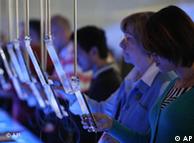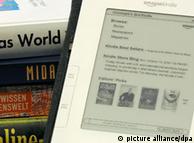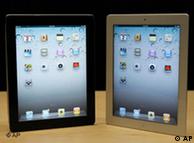E-books growth slow as Germans stick to ink and paper
While online bookseller Amazon now sells more e-books than paper ones in
the US, in Germany e-books are still a niche product. There are both
cultural and business reasons behind the low popularity rating, experts
say.
The e-book has had more difficulty gaining widespread acceptance
in Germany than in some other countries, particularly the US, experts
say. While the market is growing, according to recent studies,
traditional German attitudes toward the printed word and business
decisions by publishers have kept the e-book market's growth rate modest
until now.
Amazon.com, the American online bookseller, reported that as of April
1 of this year it had sold 105 digital books for every 100 paper ones
in its US store. In Germany, on the other hand, there is perhaps one
e-book sold for every 100 paper versions.
In 2010, according to a study by the GfK market research company,
e-books made up only 0.5 percent of overall book sales in 2010. E-books
make up just five percent of the 417 million euros in sales in the
growing German download market, which is made up of digital purchases of
music, audio and e-books, software, games and videos.
 E-books have featured prominently at the Frankfurt's Book Fair E-books have featured prominently at the Frankfurt's Book Fair
But experts and industry insiders think the German e-book market will
grow, despite lagging far behind the US market, as people's awareness
of e-books grows, the selection of titles available in digital format
expands, and e-book readers such as Amazon's Kindle or Apple's iPad
tablet computer gain traction and more widespread use.
Not enough titles
E-book readers first hit the German market at the end of 2009 and
Amazon only released the Kindle in Germany in April. The company claimed
it waited so long because there weren't enough digital books in German
available on the market. Amazon now has 25,000 digital German titles in
its store, compared to around 650,000 in its US store. The number is
growing, but is still relatively low.
 Most Germans say they prefer paper and ink Most Germans say they prefer paper and ink
According to consulting firm PriceWaterhouseCoopers (PWC), which
released a study on the e-book market, the online retailer buecher.de
carries some 100,000 titles in e-book format, that corresponds to just
eight percent of the current 1.2 million German books available in other
formats.
"For a long time, many people who would buy a e-book reader couldn't
get what they wanted, and that didn't exactly encourage them to buy,"
Christina Müller, an analyst with PWC who helped author an e-book study,
told Deutsche Welle.
Cost concerns
Cost has also been a consideration, especially for the bargain-loving
Germans. In the United States, e-books are appreciably less expensive
than their printed counterparts. But in Germany, the price difference is
low or non-existent. According to publisher Rowolt, most of its e-books
are no more than 20 percent cheaper than physical ones. For those under
10 euros, the price is the same.
"People think an e-book should be cheaper since there's no physical
object, but that calculation doesn't correspond to the industry
reality," Georg Buss, project manager for digital books at Rowolt, told
Deutsche Welle.
He said the additional costs for layout, technical checks,
investments in personnel and new technology, were substantial. For many
publishers, the e-book sector has not yet been profitable, which has
made them reluctant in the past to push e-books hard through large
advertising campaigns.
Of the company's 4,000 titles, 600 are currently available as e-books.

Love of the written word
But there is another hurdle to e-book acceptance that could be even harder to clear – a cultural one.
Germans have a different relationship to the book, according to book
analyst Müller, than those in some other countries. In the land of
renowned and beloved writers like Goethe and Schiller, not to mention
the father of the printing revolution, Johannes Gutenberg, words on
paper still have strong cultural currency.
"If you go to a bookstore on a Saturday, it will be full of people
who want to browse, to touch and leaf through books, hold them in their
hand," she said. "And we have a strong tradition of giving books as
gifts. People aren't going to go to a party and bring a memory stick
with them."
A new study by the German Booksellers Association found there is
still a powerful connection to the written word, even as digital devices
become increasingly prevalent. In 2011, 78 percent of Germans said they
did not want to read from a screen, down five percent from 2009.
But in a reversal of the trend towards greater acceptance of e-books,
the study found on 2011 that 82 percent of Germans read primarily or
exclusively printed books, one percentage point higher than in 2010.
Only seven percent reported in both 2010 and this year that they bought
both printed and digital books.
While in the US people might have to travel fairly long distances to
reach the next bookstore, in Germany the retail network is denser. If a
local store doesn't have a certain book in stock, it can easily be
ordered and arrive as early as the next day.
"There's a book retailer in nearly every German village," said
Müller. "That means the need for online stores and e-books is simply not
as great."
Outlook positive
Still, most say that despite the slow start, the outlook for the
e-book sector is good and what is now a niche product should expand as
Germans get used to the idea of buying books at the click of a mouse and
as tablet computers gain popularity.
 As tablet computing takes hold, e-books could gain market share As tablet computing takes hold, e-books could gain market share
Publishers are getting on board in larger numbers and with more
titles. Among the larger houses, 67 percent offer titles as e-books.
Some, like Rowolt, now create digital versions of all their new titles
along with the paper book.
"These newer developments, like Apple's e-books at iTunes and the
German Kindle store up and running, are going to put new life into the
e-book market in Germany," Rowolt's digital books manager Bus said.
He added that German publishers face a challenge with the arrival of
e-books and are still learning how to maneuver new territory. On the one
hand, it is an exciting time with new markets, new reading habits and
new formats to explore.
On the other hand, it has been frustrating because publishers have
had to make substantial investments without seeing much return.
"But overall, there's a spirit of optimism," he said. "Most of us
aren't afraid the book will disappear. It will be a peaceful
coexistence."
Author: Kyle James
Editor: Stuart Tiffen
http://www.dw-world.de/dw/article/0,,15137167,00.html
| 








